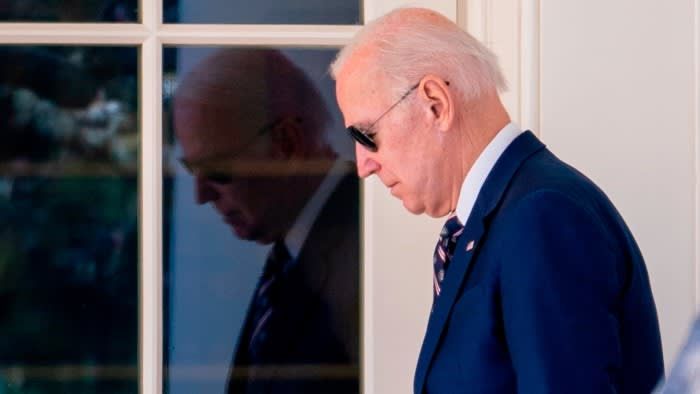Joe Biden has stepped aside: what happens next?

President Joe Biden of the United States has made a major change in the 2024 race for president by deciding to no longer participate after facing growing pressure from his own Democratic party to withdraw.
The phone calls started after a bad debate last month and increased again after the attempted attack on Donald Trump seemed to give him a new boost.
Biden gave his support to his vice-president, Kamala Harris, shortly after his announcement on Sunday, though the Democratic party has not yet officially approved.
"The Democratic Party will share its plans and strategies for the nomination process with the American people," stated Jaime Harrison, the chair of the Democratic National Committee. The process will adhere to the rules set forth by the party.
Who Will Replace Biden?
Even though Biden has given his support for Harris to take his place as the main candidate, essentially crowning her, the party has not officially chosen a nominee yet.
The president announced on X that he will be fully supporting and endorsing Kamala to be the party's nominee this year, after deciding to step back from the campaign.
If the party comes together to support her, Democrats could prevent a heated internal conflict and a disorganized open convention that reveals its ideological divisions in Chicago next month. Harris has already begun reviewing potential running mates, such as Pennsylvania governor Josh Shapiro and Kentucky governor Andy Beshear, according to two sources close to the vice president.
As a way of acknowledging possible disagreements over the chosen candidate, Biden urged everyone to unite in support of Harris. He said, "Hey Democrats, it's time to put aside differences and focus on defeating Trump. Let's make it happen."
Can Anyone Challenge Harris?
Joe Manchin, the moderate senator from West Virginia, who is 77 years old, was considering on Sunday whether to compete against Harris for the Democratic nomination, as reported by someone familiar with his thoughts. In May, he switched his party registration from Democrat to independent, and he would need to change it back in order to launch his campaign.
California's governor Gavin Newsom, who was considered a top choice for a possible replacement for Biden, publicly supported Harris's campaign. Michigan's governor Gretchen Whitmer was also anticipated to endorse the vice-president, as confirmed by three well-known Democratic party contributors and insiders.
Support from Democratic contributors is crucial. If influential donors like George and Alex Soros publicly back Harris, it will likely increase her support among other politicians and ensure a steady flow of funding.
Others might choose to initiate their own challenges, but this could lead to a conflict within the Democratic party that may end up causing more harm than benefit.
What Is Biden's Next Move?
Biden's choice reminds us of a similar situation back in March 1968, when Lyndon B Johnson surprised everyone by dropping out of the presidential race. He believed that the presidency should not be tainted by political disagreements, especially as he concentrated on the complicated Vietnam war.
Even though his time in office is coming to an end, Biden is expected to take inspiration from LBJ and concentrate on his plans for foreign policy. He aims to prioritize securing a truce in the conflict between Israel and Hamas and solidifying backing for Ukraine. Additionally, he will be actively campaigning for the candidate who will succeed him.
How To Choose A Successor?
Now that Biden has withdrawn before his official nomination at the Democratic National Convention next month, the party's guidelines define the process for selecting his replacement.
At the Democratic National Convention, there are 3,937 delegates who have pledged their support to a candidate. In order to secure the nomination, a candidate must have the backing of at least 1,976 delegates. Former candidate Biden had the support of almost all of the pledged delegates, but now that he has withdrawn from the race, those delegates are free to choose another candidate. It is expected that the majority of them will rally behind the candidate that the party as a whole supports.
"Our representatives are ready to fulfill their duty in promptly presenting a candidate to the citizens of America," stated Harrison.
The Fate Of Biden's Campaign Money
Biden and Harris are part of the same campaign group, so if Harris were to become the chosen candidate, she would still have access to the committee's $270 million funds that were raised in the last quarter.
If Biden is replaced by someone other than Harris, his campaign may need to reimburse donors. These donors can then choose to support a different candidate with the refunded money. The Leadership Now Project states that candidate-to-candidate transfers are limited to $2,000 by federal regulations.
The Biden campaign could donate a large sum of money to the DNC, allowing them to coordinate with the nominee's campaign and spend up to $32 million, as allowed by FEC regulations.
Experts in campaigning state that any remaining funds cannot be directly given to the candidate, but can instead be used to support their campaign, similar to how fundraising groups like super PACs operate.
More information was gathered by Alex Rogers and Lauren Fedor in Washington, and James Fontanella-Khan in New York.









































